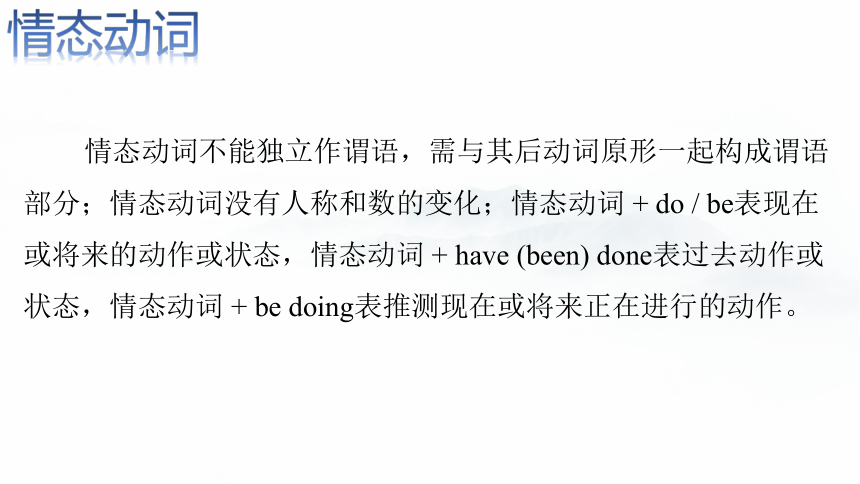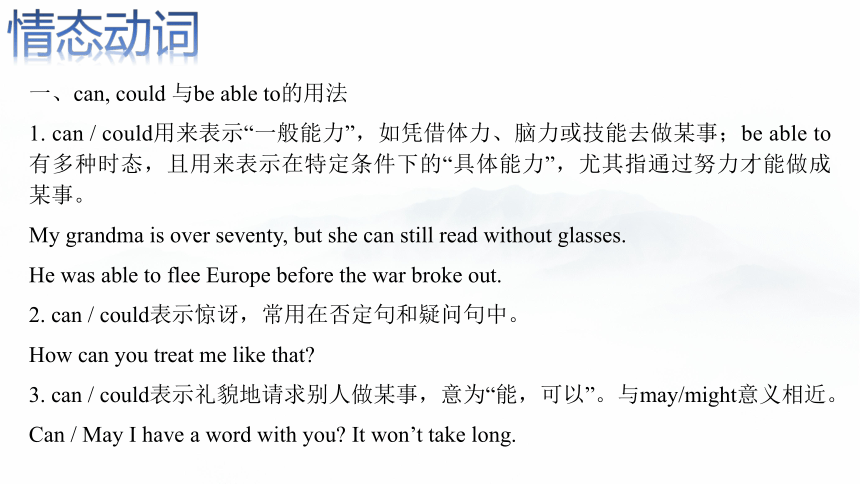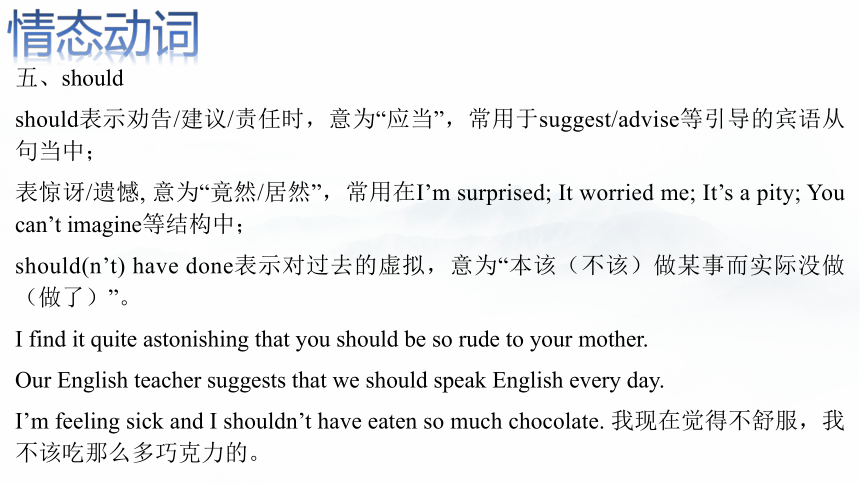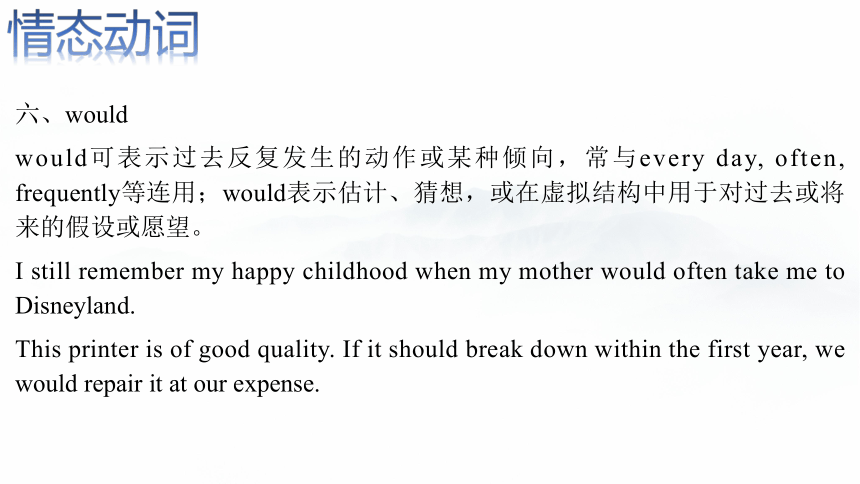2024届高三英语复习情态动词和虚拟语气的语法复习课件(共24张PPT)
文档属性
| 名称 | 2024届高三英语复习情态动词和虚拟语气的语法复习课件(共24张PPT) |  | |
| 格式 | pptx | ||
| 文件大小 | 1.2MB | ||
| 资源类型 | 教案 | ||
| 版本资源 | 通用版 | ||
| 科目 | 英语 | ||
| 更新时间 | 2023-08-01 00:49:52 | ||
图片预览









文档简介
(共24张PPT)
情态动词
与
虚拟语气
情态动词不能独立作谓语,需与其后动词原形一起构成谓语部分;情态动词没有人称和数的变化;情态动词 + do / be表现在或将来的动作或状态,情态动词 + have (been) done表过去动作或状态,情态动词 + be doing表推测现在或将来正在进行的动作。
情态动词
情态动词
一、can, could 与be able to的用法
1. can / could用来表示“一般能力”,如凭借体力、脑力或技能去做某事;be able to有多种时态,且用来表示在特定条件下的“具体能力”,尤其指通过努力才能做成某事。
My grandma is over seventy, but she can still read without glasses.
He was able to flee Europe before the war broke out.
2. can / could表示惊讶,常用在否定句和疑问句中。
How can you treat me like that
3. can / could表示礼貌地请求别人做某事,意为“能,可以”。与may/might意义相近。
Can / May I have a word with you It won’t take long.
情态动词
二、may与might
1. 表示允许,意为“可以,许可”,用法基本上同can与could。
May / Can I use your bicycle
2. 表示可能性,意为“也许,可能”。
According to the weather forecast, it may rain tomorrow.
3. may可以放在句首,表示祝愿。用may+动词原形,may须置于句首=I wish you…
May you succeed!
情态动词
三、must
must表示义务、命令或必要,意为“必须”,它的否定形式mustn’t表示“禁止”,表示说话者的命令或指令,语气比较强烈。
“must + 动词原形”表示对现在情况的推测;
“must be + 现在分词”表示对现在正在进行中的事的推测;
“must have + 过去分词”表示对过去的推测。
注意:must表推测时只能用于肯定句中。
Since nobody gave him any help, he must have done the research on his own. 因为没有人给他任何帮助,他肯定靠自己做的那项研究。
情态动词
四、shall
1. 用于第一、第三人称的疑问句中,用来征求对方的意见或请求指示。
Shall we begin our new lesson today
2. 用于第二、第三人称的陈述句中,表示说话人的意愿,有“命令、警告、允诺、威胁、强制”等意思。
You shall be punished for what you have done.
情态动词
五、should
should表示劝告/建议/责任时,意为“应当”,常用于suggest/advise等引导的宾语从句当中;
表惊讶/遗憾, 意为“竟然/居然”,常用在I’m surprised; It worried me; It’s a pity; You can’t imagine等结构中;
should(n’t) have done表示对过去的虚拟,意为“本该(不该)做某事而实际没做(做了)”。
I find it quite astonishing that you should be so rude to your mother.
Our English teacher suggests that we should speak English every day.
I’m feeling sick and I shouldn’t have eaten so much chocolate. 我现在觉得不舒服,我不该吃那么多巧克力的。
情态动词
六、would
would可表示过去反复发生的动作或某种倾向,常与every day, often, frequently等连用;would表示估计、猜想,或在虚拟结构中用于对过去或将来的假设或愿望。
I still remember my happy childhood when my mother would often take me to Disneyland.
This printer is of good quality. If it should break down within the first year, we would repair it at our expense.
情态动词
七、情态动词 + have done
其用法归纳如下
“must+have+done”表示对过去事情的肯定推测,译成“一定做过某事”,该结构只用于肯定句。
“can't+have+done”表示对过去事情的否定推测,译成“不可能做过某事”。 “can+have+done”表示对过去行为的怀疑,用于疑问句,译成“可能做过……吗?”。
“could+have+done”是虚拟语气,表示对过去事情的假设,意思是本来能够做某事而没有做。
“may+have+done”表示对发生过的事情的推测,意思是“可能已经”或“也许已经”,用于肯定句中。
情态动词
七、情态动词 + have done
“might+have+done”表示对过去事情的推测,might与may意思相同,但可能性更小。多用于虚拟语气结构中。
“would+have+done”虚拟语气,表示对过去事情的假设,意思是“本来会做”。
“should+have+done”意思是“本来应该做某事,而实际没做。” “shouldn't+have+done”表示本来不应该做某事,而实际做了。含有指责对方或自责的含意。
“ought to+have+done”表示过去应该做而实际并没有做,译成“理应做……”,往往表示遗憾。与“should+have+done”用法基本一样。
“need+have+done”表示本来需要做某事而没有做。“needn't+have+done”则表示“本来不需要做某事而做了”。
情态动词
八、常见的一些情态动词的固定结构
1. can’t…too / over = can’t…adj. /adv. enough 再…也不过分
2. can’t help/choose but do… 不得不做…
3. can’t help doing 情不自禁做(但can’t help to do意为“帮不上忙”)
4. can’t / couldn’t agree more 十分赞成
5. It can’t / couldn’t be better 十分好,非常好
6. It can’t be denied that… 不可否认的是…
7. can’t wait to do 迫不及待做某事
8. won’t / can’t have... doing 不能容忍做某事
9. may / might as well do 最好,倒不如
10. may / might well do 很可能
虚拟语气
虚拟语气用于表示主观愿望和假设的虚拟情况,说话人所讲的内容往往与事实相反,或者其实现的可能性几乎没有。另外,有时为了突出说话人的语气色彩,也使用虚拟语气。虚拟语气通过谓语动词的特殊形式来表示。
虚拟语气
一、虚拟语气在状语从句中的用法
1、关于 if 的主句及从句的虚拟结构
①与现在的事实相反,其从句结构为“If+主语+were/谓语动词的过去式”。
主句结构:主语+should/would/might/could +do
例如:If I were you, I would take an umbrella.如果我是你,我会带把伞。
(事实:我不可能是你)
②与过去的事实相反,其从句结构为“If十主语+谓语动词的过去完成式(had done)”。主句结构:主语+should/would/might/could +have done
例如:If I had got there earlier, I should/would have met her.如果我早到那儿,我就会见到她。(事实:去晚了)
虚拟语气
一、虚拟语气在状语从句中的用法
1、关于 if 的主句及从句的虚拟结构
③表示将来不太可能实现的条件,其从句结构为“If+主语+动词过去式/were to+动词原形/should+动词原形”。主句结构:主语+should/would/might/could+do
例如:If he should come here tomorrow, I would take to him.如果他明天来这的话,我就跟他谈谈。(事实:来的可能性很小,不可能)
注:在if从句中,如果含有“were,should,had’’时,可省去if而将“were,should,had’’置于句首,构成倒装句。例如:
Were I in your position, I would go.如果我处在你的位子上,我就走了。
Should he agree to go there, we would send him there.
要是他答应去的话,我们就派他去了。
虚拟语气
2. 错综时间条件句的虚拟语气
当条件状语从句表示的行为和主句表示的行为所发生的时间不一致时,被称为“错综时间条件句”,动词的形式要根据它所表示的时间做出相应的调整。
If you had followed the doctor’s advice, you would be better now.
3. 含蓄条件句中的虚拟语气。
有时假设的情况并不以条件从句表示,而是由otherwise, but, or, without, but for等来引导或者通过上下文引出。
But for your timely help, we could not have finished the task in time. 要不是你的及时帮助,我们不可能及时完成这项任务。
虚拟语气
4. if 条件句的省略
如果if条件从句中有were,had或should时,可省略连词if,同时将were, had或should提至主语前,即虚拟、倒装和省略混考点。
Should you change your mind about selling the car, I would be happy to buy it from you.
(=If you should change…)
5. if only引导的条件状语从句中,常用虚拟语气。
if only“如果…就好了”(比较:only if “只有”,不用虚拟),用一般过去时或were表与现在事实相反;用would + do表与将来事实相反;用had done表与过去事实相反。
Look at the trouble we’re in. If only we had taken our teacher’s advice.
虚拟语气
二、虚拟语气在宾语从句中的运用
1. 在would rather后接的宾语从句中使用
在would rather引导的宾语从句中,用一般过去时或were 表示对现在或将来的虚拟,用had done表示对过去的虚拟。
I would rather you had passed the exam. If so, you wouldn’t be sad now.
虚拟语气
2. 在表命令、建议、要求或请求等一类动词后面的宾语从句中使用虚拟结构,即 (should) do,常见动词有:
一个坚持:insist
两个命令:order, command
三个建议:advise, suggest, recommend
四个要求:demand, require, request, desire
Eye doctors recommend that a child’s first eye exam (should) be at the age of six months old.
注意:如果suggest不表“建议”,而表“暗示、表明”时,宾语从句不用虚拟语气,而用陈述语气,即从句动词该用什么时态就用什么时态。
虚拟语气
如果insist不表“坚持要某人做某事”,而表“坚持认为、坚持说”时,宾语从句不用虚拟语气而用陈述语气,即从句动词该用什么时态就用什么时态。
Jane’s pale face suggested(暗示)that she was ill, and her parents suggested(建议)that she (should) have a medical examination.
The old man insisted(坚持认为)that I stole / had stolen his valuable watch and insisted(坚持要求)that I (should) go to the police station with him.
虚拟语气
3. 在动词wish后面的宾语从句中
在wish后的宾语从句中,使用虚拟语气表示愿望。表示与现在事实相反的愿望,谓语动词用“过去式”;表示与过去事实相反的愿望,谓语动词用“had+过去分词”;表示与将来事实相反的愿望,谓语动词用“would / could / might + 动词原形”。
How I wish every family had a large house with a beautiful garden!
虚拟语气
三、虚拟语气在表语从句或同位语从句中的运用
当某些表示建议、请求、命令等主观意向的名词作主语时,其后的表语从句或同位语从句常用虚拟结构(should) do,这类名词常见的有:advice,suggestion, proposal, order, demand, desire, request, requirement, recommendation, wish, necessity等。
The suggestion that the mayor (should) present the prizes was accepted by everyone.
Our suggestion is that we should put on a play at the English evening.
虚拟语气
四、虚拟语气在主语从句中的运用
1. It is / was + adj. / n. + that + sb. (should) do sth.
在某些表示愿望、建议、请求、命令等形容词、名词后的主语从句中,常用虚拟结构(should) do。这类形容词和名词有:advisable可取的, compulsory强制的, desirable可取的,值得做的, essential基本的,必不可少的, important, necessary, preferable更可取,较适合, strange奇怪的, urgent紧急的, vital至关重要的, a pity令人遗憾的等。
It is necessary that we should master at least one foreign language.
我们必须至少掌握一门外语。
虚拟语气
2. 虚拟语气用在“It is + 过去分词 + that”的主语从句中。
在“It is + 过去分词 + that”引起的主语从句中,表愿望、建议、请求等主观意向时,常用虚拟结构(should) do,这类过去分词有:decided, demanded, desired, insisted, ordered, proposed, suggested, recommended, requested, required等。
It is suggested that we should get everything ready this evening.
有人建议我们今晚应该把一切准备好。
虚拟语气
五、It is(about / high)time+(that)…的虚拟语气用法
It is (about / high) time that…意思是表“该做…的时候了”,谓语动词常用should do或一般过去时表示虚拟语气,但should不能省。
It is time that the government took / should take measures to protect the rare birds and animals.
现在是政府采取措施保护珍稀鸟类和动物的时候了。
情态动词
与
虚拟语气
情态动词不能独立作谓语,需与其后动词原形一起构成谓语部分;情态动词没有人称和数的变化;情态动词 + do / be表现在或将来的动作或状态,情态动词 + have (been) done表过去动作或状态,情态动词 + be doing表推测现在或将来正在进行的动作。
情态动词
情态动词
一、can, could 与be able to的用法
1. can / could用来表示“一般能力”,如凭借体力、脑力或技能去做某事;be able to有多种时态,且用来表示在特定条件下的“具体能力”,尤其指通过努力才能做成某事。
My grandma is over seventy, but she can still read without glasses.
He was able to flee Europe before the war broke out.
2. can / could表示惊讶,常用在否定句和疑问句中。
How can you treat me like that
3. can / could表示礼貌地请求别人做某事,意为“能,可以”。与may/might意义相近。
Can / May I have a word with you It won’t take long.
情态动词
二、may与might
1. 表示允许,意为“可以,许可”,用法基本上同can与could。
May / Can I use your bicycle
2. 表示可能性,意为“也许,可能”。
According to the weather forecast, it may rain tomorrow.
3. may可以放在句首,表示祝愿。用may+动词原形,may须置于句首=I wish you…
May you succeed!
情态动词
三、must
must表示义务、命令或必要,意为“必须”,它的否定形式mustn’t表示“禁止”,表示说话者的命令或指令,语气比较强烈。
“must + 动词原形”表示对现在情况的推测;
“must be + 现在分词”表示对现在正在进行中的事的推测;
“must have + 过去分词”表示对过去的推测。
注意:must表推测时只能用于肯定句中。
Since nobody gave him any help, he must have done the research on his own. 因为没有人给他任何帮助,他肯定靠自己做的那项研究。
情态动词
四、shall
1. 用于第一、第三人称的疑问句中,用来征求对方的意见或请求指示。
Shall we begin our new lesson today
2. 用于第二、第三人称的陈述句中,表示说话人的意愿,有“命令、警告、允诺、威胁、强制”等意思。
You shall be punished for what you have done.
情态动词
五、should
should表示劝告/建议/责任时,意为“应当”,常用于suggest/advise等引导的宾语从句当中;
表惊讶/遗憾, 意为“竟然/居然”,常用在I’m surprised; It worried me; It’s a pity; You can’t imagine等结构中;
should(n’t) have done表示对过去的虚拟,意为“本该(不该)做某事而实际没做(做了)”。
I find it quite astonishing that you should be so rude to your mother.
Our English teacher suggests that we should speak English every day.
I’m feeling sick and I shouldn’t have eaten so much chocolate. 我现在觉得不舒服,我不该吃那么多巧克力的。
情态动词
六、would
would可表示过去反复发生的动作或某种倾向,常与every day, often, frequently等连用;would表示估计、猜想,或在虚拟结构中用于对过去或将来的假设或愿望。
I still remember my happy childhood when my mother would often take me to Disneyland.
This printer is of good quality. If it should break down within the first year, we would repair it at our expense.
情态动词
七、情态动词 + have done
其用法归纳如下
“must+have+done”表示对过去事情的肯定推测,译成“一定做过某事”,该结构只用于肯定句。
“can't+have+done”表示对过去事情的否定推测,译成“不可能做过某事”。 “can+have+done”表示对过去行为的怀疑,用于疑问句,译成“可能做过……吗?”。
“could+have+done”是虚拟语气,表示对过去事情的假设,意思是本来能够做某事而没有做。
“may+have+done”表示对发生过的事情的推测,意思是“可能已经”或“也许已经”,用于肯定句中。
情态动词
七、情态动词 + have done
“might+have+done”表示对过去事情的推测,might与may意思相同,但可能性更小。多用于虚拟语气结构中。
“would+have+done”虚拟语气,表示对过去事情的假设,意思是“本来会做”。
“should+have+done”意思是“本来应该做某事,而实际没做。” “shouldn't+have+done”表示本来不应该做某事,而实际做了。含有指责对方或自责的含意。
“ought to+have+done”表示过去应该做而实际并没有做,译成“理应做……”,往往表示遗憾。与“should+have+done”用法基本一样。
“need+have+done”表示本来需要做某事而没有做。“needn't+have+done”则表示“本来不需要做某事而做了”。
情态动词
八、常见的一些情态动词的固定结构
1. can’t…too / over = can’t…adj. /adv. enough 再…也不过分
2. can’t help/choose but do… 不得不做…
3. can’t help doing 情不自禁做(但can’t help to do意为“帮不上忙”)
4. can’t / couldn’t agree more 十分赞成
5. It can’t / couldn’t be better 十分好,非常好
6. It can’t be denied that… 不可否认的是…
7. can’t wait to do 迫不及待做某事
8. won’t / can’t have... doing 不能容忍做某事
9. may / might as well do 最好,倒不如
10. may / might well do 很可能
虚拟语气
虚拟语气用于表示主观愿望和假设的虚拟情况,说话人所讲的内容往往与事实相反,或者其实现的可能性几乎没有。另外,有时为了突出说话人的语气色彩,也使用虚拟语气。虚拟语气通过谓语动词的特殊形式来表示。
虚拟语气
一、虚拟语气在状语从句中的用法
1、关于 if 的主句及从句的虚拟结构
①与现在的事实相反,其从句结构为“If+主语+were/谓语动词的过去式”。
主句结构:主语+should/would/might/could +do
例如:If I were you, I would take an umbrella.如果我是你,我会带把伞。
(事实:我不可能是你)
②与过去的事实相反,其从句结构为“If十主语+谓语动词的过去完成式(had done)”。主句结构:主语+should/would/might/could +have done
例如:If I had got there earlier, I should/would have met her.如果我早到那儿,我就会见到她。(事实:去晚了)
虚拟语气
一、虚拟语气在状语从句中的用法
1、关于 if 的主句及从句的虚拟结构
③表示将来不太可能实现的条件,其从句结构为“If+主语+动词过去式/were to+动词原形/should+动词原形”。主句结构:主语+should/would/might/could+do
例如:If he should come here tomorrow, I would take to him.如果他明天来这的话,我就跟他谈谈。(事实:来的可能性很小,不可能)
注:在if从句中,如果含有“were,should,had’’时,可省去if而将“were,should,had’’置于句首,构成倒装句。例如:
Were I in your position, I would go.如果我处在你的位子上,我就走了。
Should he agree to go there, we would send him there.
要是他答应去的话,我们就派他去了。
虚拟语气
2. 错综时间条件句的虚拟语气
当条件状语从句表示的行为和主句表示的行为所发生的时间不一致时,被称为“错综时间条件句”,动词的形式要根据它所表示的时间做出相应的调整。
If you had followed the doctor’s advice, you would be better now.
3. 含蓄条件句中的虚拟语气。
有时假设的情况并不以条件从句表示,而是由otherwise, but, or, without, but for等来引导或者通过上下文引出。
But for your timely help, we could not have finished the task in time. 要不是你的及时帮助,我们不可能及时完成这项任务。
虚拟语气
4. if 条件句的省略
如果if条件从句中有were,had或should时,可省略连词if,同时将were, had或should提至主语前,即虚拟、倒装和省略混考点。
Should you change your mind about selling the car, I would be happy to buy it from you.
(=If you should change…)
5. if only引导的条件状语从句中,常用虚拟语气。
if only“如果…就好了”(比较:only if “只有”,不用虚拟),用一般过去时或were表与现在事实相反;用would + do表与将来事实相反;用had done表与过去事实相反。
Look at the trouble we’re in. If only we had taken our teacher’s advice.
虚拟语气
二、虚拟语气在宾语从句中的运用
1. 在would rather后接的宾语从句中使用
在would rather引导的宾语从句中,用一般过去时或were 表示对现在或将来的虚拟,用had done表示对过去的虚拟。
I would rather you had passed the exam. If so, you wouldn’t be sad now.
虚拟语气
2. 在表命令、建议、要求或请求等一类动词后面的宾语从句中使用虚拟结构,即 (should) do,常见动词有:
一个坚持:insist
两个命令:order, command
三个建议:advise, suggest, recommend
四个要求:demand, require, request, desire
Eye doctors recommend that a child’s first eye exam (should) be at the age of six months old.
注意:如果suggest不表“建议”,而表“暗示、表明”时,宾语从句不用虚拟语气,而用陈述语气,即从句动词该用什么时态就用什么时态。
虚拟语气
如果insist不表“坚持要某人做某事”,而表“坚持认为、坚持说”时,宾语从句不用虚拟语气而用陈述语气,即从句动词该用什么时态就用什么时态。
Jane’s pale face suggested(暗示)that she was ill, and her parents suggested(建议)that she (should) have a medical examination.
The old man insisted(坚持认为)that I stole / had stolen his valuable watch and insisted(坚持要求)that I (should) go to the police station with him.
虚拟语气
3. 在动词wish后面的宾语从句中
在wish后的宾语从句中,使用虚拟语气表示愿望。表示与现在事实相反的愿望,谓语动词用“过去式”;表示与过去事实相反的愿望,谓语动词用“had+过去分词”;表示与将来事实相反的愿望,谓语动词用“would / could / might + 动词原形”。
How I wish every family had a large house with a beautiful garden!
虚拟语气
三、虚拟语气在表语从句或同位语从句中的运用
当某些表示建议、请求、命令等主观意向的名词作主语时,其后的表语从句或同位语从句常用虚拟结构(should) do,这类名词常见的有:advice,suggestion, proposal, order, demand, desire, request, requirement, recommendation, wish, necessity等。
The suggestion that the mayor (should) present the prizes was accepted by everyone.
Our suggestion is that we should put on a play at the English evening.
虚拟语气
四、虚拟语气在主语从句中的运用
1. It is / was + adj. / n. + that + sb. (should) do sth.
在某些表示愿望、建议、请求、命令等形容词、名词后的主语从句中,常用虚拟结构(should) do。这类形容词和名词有:advisable可取的, compulsory强制的, desirable可取的,值得做的, essential基本的,必不可少的, important, necessary, preferable更可取,较适合, strange奇怪的, urgent紧急的, vital至关重要的, a pity令人遗憾的等。
It is necessary that we should master at least one foreign language.
我们必须至少掌握一门外语。
虚拟语气
2. 虚拟语气用在“It is + 过去分词 + that”的主语从句中。
在“It is + 过去分词 + that”引起的主语从句中,表愿望、建议、请求等主观意向时,常用虚拟结构(should) do,这类过去分词有:decided, demanded, desired, insisted, ordered, proposed, suggested, recommended, requested, required等。
It is suggested that we should get everything ready this evening.
有人建议我们今晚应该把一切准备好。
虚拟语气
五、It is(about / high)time+(that)…的虚拟语气用法
It is (about / high) time that…意思是表“该做…的时候了”,谓语动词常用should do或一般过去时表示虚拟语气,但should不能省。
It is time that the government took / should take measures to protect the rare birds and animals.
现在是政府采取措施保护珍稀鸟类和动物的时候了。
